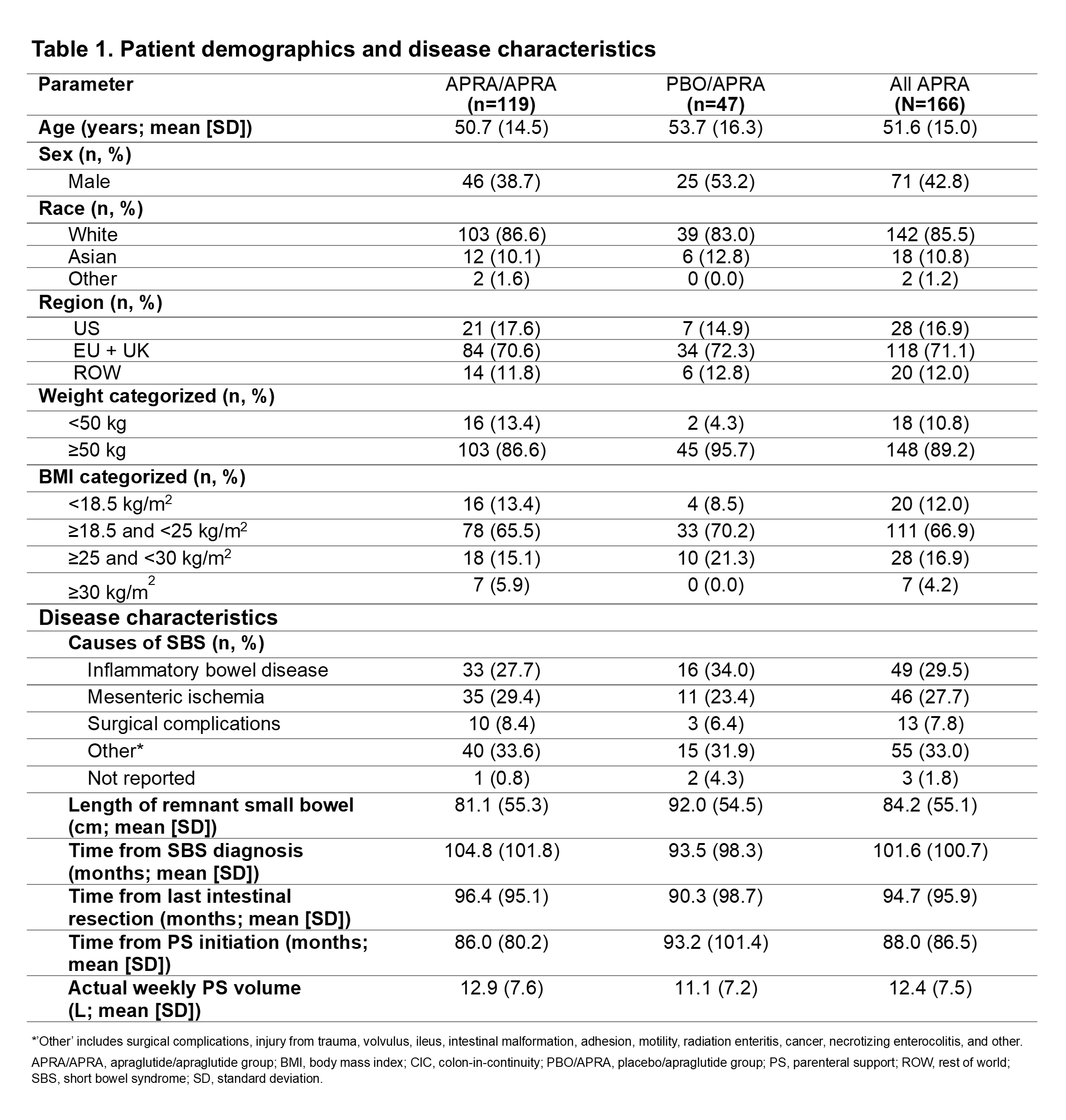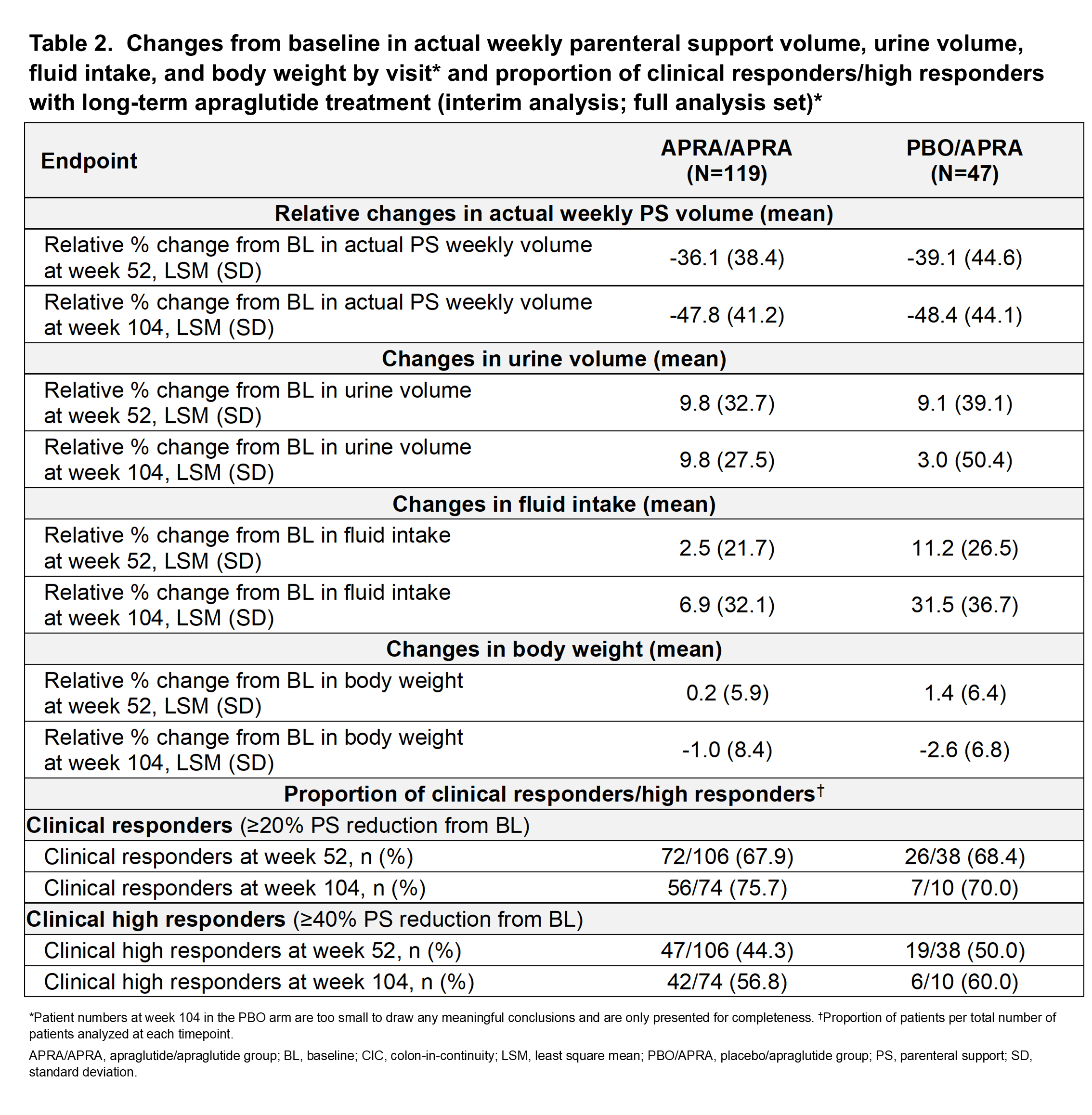Monday Poster Session
Category: Small Intestine
P4044 - Long-Term Treatment With Once-Weekly Apraglutide Reduces Parenteral Support Volume and Increases Clinical Responder Rates in Patients With Short Bowel Syndrome and Intestinal Failure: The STARS Extend Trial
Monday, October 27, 2025
10:30 AM - 4:00 PM PDT
Location: Exhibit Hall

Mena Boules, MD
Ironwood Pharmaceuticals, Inc.
Boston, Massachusetts
Presenting Author(s)
Simon Lal, MD, PhD1, Donald Kirby, MD2, Kelly Tappenden, PhD, RD3, Palle Jeppesen, MD, PhD4, Francisca Joly, MD, PhD5, Chang Ming, PhD6, Tomasz Masior, MD6, Mena Boules, MD7, Tim Vanuytsel, MD, PhD8, Kishore Iyer, MBBS, FRCS9
1University of Manchester, Manchester, England, United Kingdom; 2Cleveland Clinic Digestive Disease and Surgery Institute, Cleveland, OH; 3The University of Utah, Salt Lake City, UT; 4Rigshospitalet, Copenhagen University Hospital, Boston, MA; 5Centre for Intestinal Failure, Department of Gastroenterology and Nutritional Support, Hôpital Beaujon, Clichy, Ile-de-France, France; 6Ironwood Pharmaceuticals, Inc., Basel, Basel-Stadt, Switzerland; 7Ironwood Pharmaceuticals, Inc., Boston, MA; 8Leuven Intestinal Failure and Transplantation Center (LIFT), University Hospitals Leuven, Leuven, Vlaams-Brabant, Belgium; 9Mount Sinai Medical Center/Icahn School of Medicine at Mount Sinai, New York, NY
Introduction: Patients with short bowel syndrome and intestinal failure are dependent on parenteral support (PS) to meet nutritional and/or fluid requirements. Apraglutide (APRA), a long-acting glucagon-like peptide-2 (GLP-2) analog administered subcutaneously once-weekly, stimulates intestinal adaptation and has been shown to reduce PS requirements in the open-label, phase 2 metabolic balance study STARS Nutrition (NCT04964986) and the phase 3, randomized, double-blind STARS study (NCT04627025). STARS Extend (NCT05018286) is an open-label, long-term extension (LTE) trial designed to evaluate the long-term safety of APRA and determine whether treatment effects are maintained in the long term.
Methods: Patients who completed STARS Nutrition or STARS without meeting stopping criteria could enroll in STARS Extend, either switching to APRA for those previously on placebo (PBO) or continuing to receive APRA (APRA/APRA group). APRA was given at a dose of 3.5 mg if patient ≥50 kg or 1.4 mg if < 50 kg, for up to 208 weeks. The primary objective was to assess long-term safety and tolerability; secondary endpoints included changes from baseline (BL; defined as start of APRA treatment in weekly PS volume and proportion of clinical responders (≥20% reduction) and high responders (≥40% reduction) at weeks 52, 104, 152, and 208.
Results: As of January 2025, 166 patients were analyzed (APRA/APRA, n=119; PBRO/APRA, n=47). BL demographics and disease characteristics were generally balanced across groups (Table 1). Reductions in weekly PS volume from BL were similar in both groups (-36.1% vs -39.1% at week 52 for APRA/APRA vs PBO/APRA), with small variations in urine volume, fluid intake and body weight (Table 2). The proportion of clinical responders was high in both groups (67.9% vs 68.4% for APRA/APRA and PBO/APRA at week 52), with rates of 44.3% vs 50.0% for clinical high responders (Table 2). APRA was well tolerated with long-term use; discontinuation of APRA due to adverse events (AEs) occurred in 6.7% (8/119) of patients in the APRA/APRA group and 2.1% (1/47) of those in the PBO/APRA group. No AEs led to dose reduction, and study discontinuation due to AEs occurred in 1 patient in each group.
Discussion: Long-term treatment with once-weekly APRA resulted in sustained reductions in relative percentage change in weekly PS volume from BL of 48% at week 104, and high clinical responder rates. APRA was well tolerated throughout the treatment period.

Figure: Table 1

Figure: Table 2
Disclosures:
Simon Lal: B Braun – Honoraria and/or educational support. Baxter – Grant/Research Support, Honoraria and/or educational support. Fresenius Kabi – Grant/Research Support, Honoraria and/or educational support. Ironwood Pharmaceuticals, Inc. (Previously VectivBio) – Honoraria and/or educational support. Northsea – Honoraria and/or educational support. Takeda – Grant/Research Support, Honoraria and/or educational support. Zealand – Honoraria and/or educational support.
Donald Kirby: Ironwood Pharmaceuticals, Inc. (Previously VectivBio) – Consultant. OWYN – Consultant. Takeda Pharma – Consultant.
Kelly Tappenden: Abbott Nutrition Health Institute – Advisory Committee/Board Member. Ironwood Pharmaceuticals, Inc (Previously VectivBio) – Advisory Committee/Board Member. Nutricia North America – Advisory Committee/Board Member. Takeda Pharmaceuticals – Advisory Committee/Board Member.
Palle Jeppesen: Albumedix A/S – Grant/Research Support. ArTara Therapeutics – Grant/Research Support. Bainan Biotech – Grant/Research Support. Baxter – Grant/Research Support. Coloplast A/S – Grant/Research Support. Ferring Pharmaceuticals – Grant/Research Support. Fresenius Kabi – Grant/Research Support. GlyPharma Therapeutic – Grant/Research Support. Hanmi Pharmaceuticals – Grant/Research Support. Ironwood Pharmaceuticals, Inc. (Previously VectivBio) – Grant/Research Support. Naia Pharmaceuticals – Grant/Research Support. NPS Pharmaceuticals – Grant/Research Support. Protara Therapeutics – Grant/Research Support. Shire – Grant/Research Support. Takeda – Grant/Research Support. The Novo Nordisk Foundation – Grant/Research Support. Therachon – Grant/Research Support. Zealand Pharma A/S – Grant/Research Support.
Francisca Joly: Baxter – Grant/Research Support, Lecturer. BBraun – Lecturer. Carembouche – Consultant, Grant/Research Support. Fresenius Kabi – Lecturer. Hanmi – Consultant. Ironwood Pharmaceuticals, Inc. (Previously VectivBio) – Consultant, Grant/Research Support. Janssen – Lecturer. Mobile3esolutions – Consultant, Grant/Research Support. NorthSea Therapeutics – Consultant. Takeda – Consultant, Grant/Research Support. Theradial – Consultant. Zealand – Consultant, Grant/Research Support.
Chang Ming: Ironwood Pharmaceuticals, Inc (Previously VectivBio) – Employee.
Tomasz Masior: Ironwood Pharmaceuticals, Inc (Previously VectivBio) – Employee.
Mena Boules: Ironwood Pharmaceuticals, Inc (Previously VectivBio) – Employee, Stock-publicly held company(excluding mutual/index funds).
Tim Vanuytsel: Abbott – Lecturer. Baxter – Consultant, Lecturer. Biocodex – Lecturer. BMS – Consultant. Danone – Grant/Research Support. Dr. Falk Pharma – Consultant, Lecturer. Fresenius Kabi – Lecturer. Hanmi Pharm – Consultant. Ipsen – Lecturer. Ironwood Pharmaceuticals, Inc. (Previously VectivBio) – Consultant, Grant/Research Support, Lecturer. Menarini – Lecturer. MyHealth – Grant/Research Support, Lecturer. North Sea Therapeutics – Consultant. Remedus – Lecturer. Takeda – Consultant, Grant/Research Support, Lecturer. Truvion – Consultant, Lecturer. Zealand Pharma – Consultant.
Kishore Iyer: Hanmi Pharmaceuticals – Advisor or Review Panel Member. Ironwood Pharmaceuticals, Inc. (Previously VectivBio) – Advisor or Review Panel Member, Grant/Research Support. Northsea Therapeutics – Advisor or Review Panel Member, Grant/Research Support. Takeda Pharma – Consultant, Grant/Research Support, Speakers Bureau.
Simon Lal, MD, PhD1, Donald Kirby, MD2, Kelly Tappenden, PhD, RD3, Palle Jeppesen, MD, PhD4, Francisca Joly, MD, PhD5, Chang Ming, PhD6, Tomasz Masior, MD6, Mena Boules, MD7, Tim Vanuytsel, MD, PhD8, Kishore Iyer, MBBS, FRCS9. P4044 - Long-Term Treatment With Once-Weekly Apraglutide Reduces Parenteral Support Volume and Increases Clinical Responder Rates in Patients With Short Bowel Syndrome and Intestinal Failure: The STARS Extend Trial, ACG 2025 Annual Scientific Meeting Abstracts. Phoenix, AZ: American College of Gastroenterology.
1University of Manchester, Manchester, England, United Kingdom; 2Cleveland Clinic Digestive Disease and Surgery Institute, Cleveland, OH; 3The University of Utah, Salt Lake City, UT; 4Rigshospitalet, Copenhagen University Hospital, Boston, MA; 5Centre for Intestinal Failure, Department of Gastroenterology and Nutritional Support, Hôpital Beaujon, Clichy, Ile-de-France, France; 6Ironwood Pharmaceuticals, Inc., Basel, Basel-Stadt, Switzerland; 7Ironwood Pharmaceuticals, Inc., Boston, MA; 8Leuven Intestinal Failure and Transplantation Center (LIFT), University Hospitals Leuven, Leuven, Vlaams-Brabant, Belgium; 9Mount Sinai Medical Center/Icahn School of Medicine at Mount Sinai, New York, NY
Introduction: Patients with short bowel syndrome and intestinal failure are dependent on parenteral support (PS) to meet nutritional and/or fluid requirements. Apraglutide (APRA), a long-acting glucagon-like peptide-2 (GLP-2) analog administered subcutaneously once-weekly, stimulates intestinal adaptation and has been shown to reduce PS requirements in the open-label, phase 2 metabolic balance study STARS Nutrition (NCT04964986) and the phase 3, randomized, double-blind STARS study (NCT04627025). STARS Extend (NCT05018286) is an open-label, long-term extension (LTE) trial designed to evaluate the long-term safety of APRA and determine whether treatment effects are maintained in the long term.
Methods: Patients who completed STARS Nutrition or STARS without meeting stopping criteria could enroll in STARS Extend, either switching to APRA for those previously on placebo (PBO) or continuing to receive APRA (APRA/APRA group). APRA was given at a dose of 3.5 mg if patient ≥50 kg or 1.4 mg if < 50 kg, for up to 208 weeks. The primary objective was to assess long-term safety and tolerability; secondary endpoints included changes from baseline (BL; defined as start of APRA treatment in weekly PS volume and proportion of clinical responders (≥20% reduction) and high responders (≥40% reduction) at weeks 52, 104, 152, and 208.
Results: As of January 2025, 166 patients were analyzed (APRA/APRA, n=119; PBRO/APRA, n=47). BL demographics and disease characteristics were generally balanced across groups (Table 1). Reductions in weekly PS volume from BL were similar in both groups (-36.1% vs -39.1% at week 52 for APRA/APRA vs PBO/APRA), with small variations in urine volume, fluid intake and body weight (Table 2). The proportion of clinical responders was high in both groups (67.9% vs 68.4% for APRA/APRA and PBO/APRA at week 52), with rates of 44.3% vs 50.0% for clinical high responders (Table 2). APRA was well tolerated with long-term use; discontinuation of APRA due to adverse events (AEs) occurred in 6.7% (8/119) of patients in the APRA/APRA group and 2.1% (1/47) of those in the PBO/APRA group. No AEs led to dose reduction, and study discontinuation due to AEs occurred in 1 patient in each group.
Discussion: Long-term treatment with once-weekly APRA resulted in sustained reductions in relative percentage change in weekly PS volume from BL of 48% at week 104, and high clinical responder rates. APRA was well tolerated throughout the treatment period.

Figure: Table 1

Figure: Table 2
Disclosures:
Simon Lal: B Braun – Honoraria and/or educational support. Baxter – Grant/Research Support, Honoraria and/or educational support. Fresenius Kabi – Grant/Research Support, Honoraria and/or educational support. Ironwood Pharmaceuticals, Inc. (Previously VectivBio) – Honoraria and/or educational support. Northsea – Honoraria and/or educational support. Takeda – Grant/Research Support, Honoraria and/or educational support. Zealand – Honoraria and/or educational support.
Donald Kirby: Ironwood Pharmaceuticals, Inc. (Previously VectivBio) – Consultant. OWYN – Consultant. Takeda Pharma – Consultant.
Kelly Tappenden: Abbott Nutrition Health Institute – Advisory Committee/Board Member. Ironwood Pharmaceuticals, Inc (Previously VectivBio) – Advisory Committee/Board Member. Nutricia North America – Advisory Committee/Board Member. Takeda Pharmaceuticals – Advisory Committee/Board Member.
Palle Jeppesen: Albumedix A/S – Grant/Research Support. ArTara Therapeutics – Grant/Research Support. Bainan Biotech – Grant/Research Support. Baxter – Grant/Research Support. Coloplast A/S – Grant/Research Support. Ferring Pharmaceuticals – Grant/Research Support. Fresenius Kabi – Grant/Research Support. GlyPharma Therapeutic – Grant/Research Support. Hanmi Pharmaceuticals – Grant/Research Support. Ironwood Pharmaceuticals, Inc. (Previously VectivBio) – Grant/Research Support. Naia Pharmaceuticals – Grant/Research Support. NPS Pharmaceuticals – Grant/Research Support. Protara Therapeutics – Grant/Research Support. Shire – Grant/Research Support. Takeda – Grant/Research Support. The Novo Nordisk Foundation – Grant/Research Support. Therachon – Grant/Research Support. Zealand Pharma A/S – Grant/Research Support.
Francisca Joly: Baxter – Grant/Research Support, Lecturer. BBraun – Lecturer. Carembouche – Consultant, Grant/Research Support. Fresenius Kabi – Lecturer. Hanmi – Consultant. Ironwood Pharmaceuticals, Inc. (Previously VectivBio) – Consultant, Grant/Research Support. Janssen – Lecturer. Mobile3esolutions – Consultant, Grant/Research Support. NorthSea Therapeutics – Consultant. Takeda – Consultant, Grant/Research Support. Theradial – Consultant. Zealand – Consultant, Grant/Research Support.
Chang Ming: Ironwood Pharmaceuticals, Inc (Previously VectivBio) – Employee.
Tomasz Masior: Ironwood Pharmaceuticals, Inc (Previously VectivBio) – Employee.
Mena Boules: Ironwood Pharmaceuticals, Inc (Previously VectivBio) – Employee, Stock-publicly held company(excluding mutual/index funds).
Tim Vanuytsel: Abbott – Lecturer. Baxter – Consultant, Lecturer. Biocodex – Lecturer. BMS – Consultant. Danone – Grant/Research Support. Dr. Falk Pharma – Consultant, Lecturer. Fresenius Kabi – Lecturer. Hanmi Pharm – Consultant. Ipsen – Lecturer. Ironwood Pharmaceuticals, Inc. (Previously VectivBio) – Consultant, Grant/Research Support, Lecturer. Menarini – Lecturer. MyHealth – Grant/Research Support, Lecturer. North Sea Therapeutics – Consultant. Remedus – Lecturer. Takeda – Consultant, Grant/Research Support, Lecturer. Truvion – Consultant, Lecturer. Zealand Pharma – Consultant.
Kishore Iyer: Hanmi Pharmaceuticals – Advisor or Review Panel Member. Ironwood Pharmaceuticals, Inc. (Previously VectivBio) – Advisor or Review Panel Member, Grant/Research Support. Northsea Therapeutics – Advisor or Review Panel Member, Grant/Research Support. Takeda Pharma – Consultant, Grant/Research Support, Speakers Bureau.
Simon Lal, MD, PhD1, Donald Kirby, MD2, Kelly Tappenden, PhD, RD3, Palle Jeppesen, MD, PhD4, Francisca Joly, MD, PhD5, Chang Ming, PhD6, Tomasz Masior, MD6, Mena Boules, MD7, Tim Vanuytsel, MD, PhD8, Kishore Iyer, MBBS, FRCS9. P4044 - Long-Term Treatment With Once-Weekly Apraglutide Reduces Parenteral Support Volume and Increases Clinical Responder Rates in Patients With Short Bowel Syndrome and Intestinal Failure: The STARS Extend Trial, ACG 2025 Annual Scientific Meeting Abstracts. Phoenix, AZ: American College of Gastroenterology.
